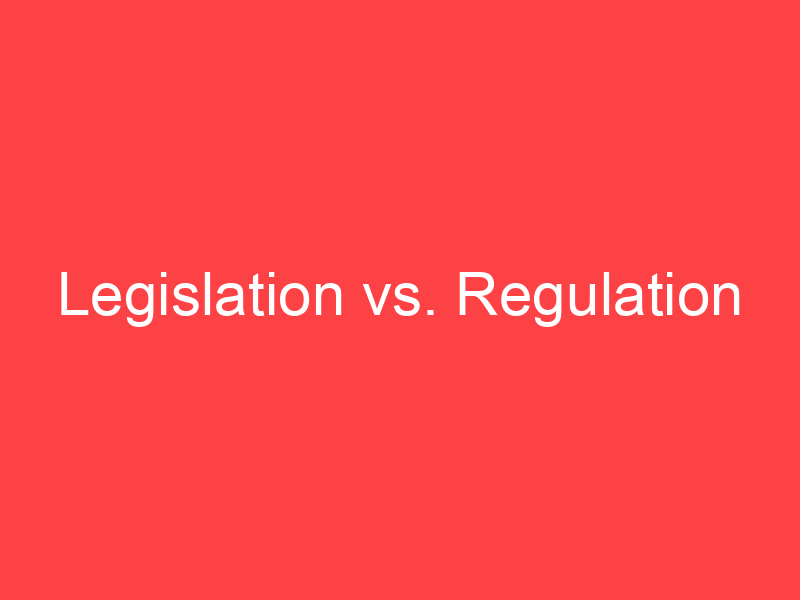Main Difference
The main difference between Legislation and Regulation is that the Legislation is a law that has been enacted by a legislature or other governing body and Regulation is a general term for rules, including delegated legislation and self-regulation
-
Legislation
Legislation (or “statutory law”) is law which has been promulgated (or “enacted”) by a legislature or other governing body or the process of making it. Before an item of legislation becomes law it may be known as a bill, and may be broadly referred to as “legislation”, while it remains under consideration to distinguish it from other business. Legislation can have many purposes: to regulate, to authorize, to outlaw, to provide (funds), to sanction, to grant, to declare or to restrict. It may be contrasted with a non-legislative act which is adopted by an executive or administrative body under the authority of a legislative act or for implementing a legislative act.Under the Westminster system, an item of primary legislation is known as an Act of Parliament after enactment.
Legislation is usually proposed by a member of the legislature (e.g. a member of Congress or Parliament), or by the executive, where upon it is debated by members of the legislature and is often amended before passage. Most large legislatures enact only a small fraction of the bills proposed in a given session. Whether a given bill will be proposed and is generally a matter of the legislative priorities of government.
Legislation is regarded as one of the three main functions of government, which are often distinguished under the doctrine of the separation of powers. Those who have the formal power to create legislation are known as legislators; a judicial branch of government will have the formal power to interpret legislation (see statutory interpretation); the executive branch of government can act only within the powers and limits set by the law.
-
Regulation
Regulation is an abstract concept of management of complex systems according to a set of rules and trends. In systems theory, these types of rules exist in various fields of biology and society, but the term has slightly different meanings according to context. For example:
in biology, gene regulation and metabolic regulation allow living organisms to adapt to their environment and maintain homeostasis;
in government, typically regulation means stipulations of the delegated legislation which is drafted by subject-matter experts to enforce primary legislation;
in business, industry self-regulation occurs through self-regulatory organizations and trade associations which allow industries to set and enforce rules with less government involvement; and,
in psychology, self-regulation theory is the study of how individuals regulate their thoughts and behaviors to reach goals.
-
Legislation (noun)
The act of legislating; preparation and enactment of laws; the laws enacted.
-
Legislation (noun)
Law which has been enacted by legislature or other governing body
-
Regulation (noun)
The act of regulating or the condition of being regulated.
-
Regulation (noun)
A law or administrative rule, issued by an organization, used to guide or prescribe the conduct of members of that organization.
-
Regulation (noun)
A form of legislative act which is self-effecting, and requires no further intervention by the Member States to become law.
-
Regulation (noun)
Mechanism controlling DNA transcription.
-
Regulation (noun)
Physiological process which consists in maintaining homoeostasis.
-
Regulation (adjective)
In conformity with applicable rules and regulations.
-
Legislation (noun)
laws, considered collectively
“housing legislation”
-
Legislation (noun)
the process of making or enacting laws
“it will require legislation to change this situation”
-
Regulation (noun)
a rule or directive made and maintained by an authority
“planning regulations”
-
Regulation (noun)
in accordance with regulations; of the correct type
“regulation army footwear”
-
Regulation (noun)
of a familiar or predictable type; formulaic
“a regulation Western parody”
-
Regulation (noun)
the action or process of regulating or being regulated
“the regulation of financial markets”

